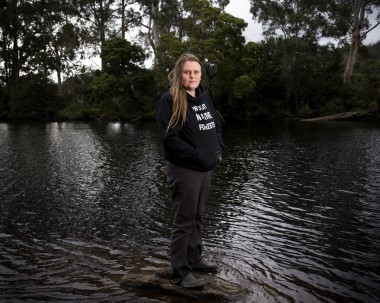“I measure the personal abuse I experience against the extreme violence that is experienced by environmental advocates in other parts of the globe, and it doesn’t measure as bad.
Jenny Weber.
Nobody could argue Weber’s dedication to the environment. She has spent twelve years co-ordinating hundreds of direct action campaigns in Tasmania’s southern world heritage forests.
She’s also a researcher, mum of two and winner of the Bob Brown Foundation’s Environmentalist of the year award.
Meet Jenny..
MH: Jenny you have been a volunteer forest activist for 15 years. Why are you so desperate to rid the world’s old growth forests of the chain saws?
JW: It’s not out of desperation. I formed a passion for environmental protection as a young person and when I moved to Tasmania after experiencing the ancient forests, witnessing their destruction and learning about the tax-payer subsidies used to prop up a logging industry, I found myself compelled to participate in the movement for change here.
Knowing that this ecosystem has evolved over millions of years – connecting back to the Gondwana period – I experience a sense of awe that these places are an example of nature at its wildest. When I swim in the rivers that are flanked by these ancient forests and I know that this water is clean, occasionally seeing a platypus swimming in these rivers, seeing my children delight in walking in the forests, seeing the baby Tasmanian devil wandering the forest, and watching the wedge tailed eagles soar in the sky. I’m in awe. But forests like these are scarce globally and the rapid loss of forests across the globe is relentless.
MH: How have you handled the personal abuse directed by those with opposite view to you?
JW: I have a strong community of activists, supporters and a loving family who provide support at these times. I measure the personal abuse I experience against the extreme violence that is experienced by environmental advocates in other parts of the globe, and it doesn’t measure as bad. I also don’t agree that hurling personal abuse at me is an appropriate way to behave in the street, certainly threats of violence and hate rallies are actions that should be publicly challenged. I aim to live according to principles of non-violence in my life, so non-violent communication is one of these principles.
I have been in situations as an environmentalist that should be seen as unacceptable in the community; I have had a death threat on Facebook, I had to face a logger with a knife in an action once who was trying to cut the tree sitters ropes.
MH: What do you say to the people whose livelihoods depend on these industries?
JW: In our region right now, people are experiencing a disruption in their lives, as they have been dependent on a logging industry that is in crisis. That logging industry has stripped bare very large areas of land in Tasmania, areas that were once large tracts of tall-eucalypt forests, rainforests and water catchment areas.
This industry logged at a rapid rate for an industry dominated by export woodchipping. When I arrived in Tasmania 15 years ago, I learned that the Tasmanian logging industry was going to reach a problem time when the plantations in South America and South East Asia would come on-line. These cheaper sources of woodchips came on-line and along with the high Australian dollar, the logging industry in Tasmania faced collapse.
These people whose livelihoods depend on the logging industries are facing hardship, and need a supportive environment to transition out of the industry that has proven to be uneconomical.
MH: With all due respect, in many people’s minds there are much more pressing issues, mortgages, putting food on the table, health – what would you say to people who don’t understand where you’re coming from?
JW: Paying the mortgage, putting food on the table and health are all issues I have to deal with as well, and they are pressing on my life as well. Though all these things can’t be considered separated or disconnected from how we treat the environment and climate.
Sure there are people in the world who think personal maintenance such as mortgages and food on the table are more important than the health of the environment.
I respect that people have no other choice than to have a focus on maintaining their health. Of course there are many day-to-day stresses that people would prioritise over taking action on the environment. My life direction has meant that I am healthy, I have a loving family, and I am at a time in my life that it is ok to be a forest advocate.
MH: You’re a mum of two kids how do you balance activism with raising your family?
JW: My family comes first, I have two wonderful children Ruby and Finn, and a loving and supportive partner of 17 years, Adam. My partner Adam shares my passion for the forests and activism. Balancing activism and raising our family has come naturally.
My work over the past ten years of Ruby and Finn’s life at the Huon Valley Environment Centre has been with other women who are mothers, our children have played together while we work in the environment centre and we have shared parenting… For example while we organise an art exhibition, or have action planning meetings, the children play safely in the environment centre.
HOOK UP WITH JENNY:
You can find our more www.huon.org/
